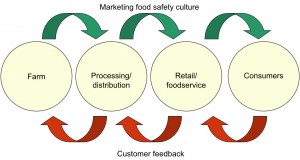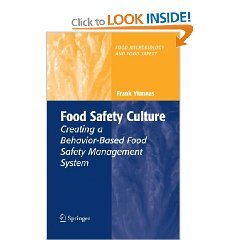In Jan. 2009, Peanut Corporation of America (PCA) recalled over 3,900 peanut butter and other peanut-containing products from more than 350 companies after an outbreak of Salmonella Typhimurium ultimately sickened 691 people and killed nine across 46 U.S. states and Canada.
The human toll related to a bunch of peanut-paste containing crackers and snacky thingies seems tragically outrageous. How people and  corporations respond seems tragically disrespectful to those who got sick and died.
corporations respond seems tragically disrespectful to those who got sick and died.
Kellogg was one of the hardest hit food processors that used PCA paste, recalling hundreds of products. In response to the outbreak, then CEO David Mackay told a congressional hearing on March 19, 2009, that PCA had been audited by the American Institute of Baking (AIB) “the most commonly used auditor in the U.S” and received a SUPERIOR rating.
Microsoft’s DOS used to be the most commonly used personal computer operating system, but that doesn’t mean it was any good: it sucked (which is why I’ve used the Mac OS since 1988).
Mackay also said, “When you look at Kellogg, we have 3,000 ingredients and 1,000 suppliers, I think it’s common industry practice to use a third party.”
Not common enough for Nestle North America, which rejected Peanut Corporation of America’s Blakely plant as a supplier in 2002 after it found the plant had no plans to address hazards like salmonella. Nestle again rejected PCA as a supplier in 2006.
Nestle did what Kellogg should have done. CEO Mackay responded to the 2009 outbreak by telling Congress that lawmakers needed to overhaul the nation’s food safety system.
Kellogg, a multi-billion dollar company, asked for a government handout to do what Kellogg should be doing – selling a safe product.  Kellogg helped create the paper albatross that is third-party audits instead of having its own people at plants that supply product which Kellogg resells at a substantial profit.
Kellogg helped create the paper albatross that is third-party audits instead of having its own people at plants that supply product which Kellogg resells at a substantial profit.
This is all familiar background to a story by Todd Spangler of the Detroit Free Press and appearing in the USA Today today.
Spangler writes the International Food Protection Training Institute (IFPTI), now part of the Global Food Protection Institute (GFPI) in Battle Creek, has helped train thousands of inspectors and worked with officials from China, Turkey and elsewhere to improve food safety.
“The institute has become more than they ever envisioned,” said President and CEO Julia Bradsher, referring to the people at the civic group Battle Creek Unlimited and the Kellogg Foundation, which helped fund the institute’s creation as a way to generate economic activity in the city and capitalize on the food industry expertise nearby.
A staff of three has grown to 18 regular and contract employees, plus a nationwide network of nearly 100 instructors.
“It’s creating a food safety culture — it becomes part of your culture,” said Sue Estes, global food safety manager for PepsiCo, who also has worked with the institute.
In October, GFPI, the umbrella organization over the training institute, hosted a conference on food transportation issues: Mark Moorman, Kellogg’s senior director of global regulatory science, gave a talk on the “Things That Keep Me Up at Night,” which covered a wide array of topics including the evolving means of detecting problems, the age and issues with transport trucks and social media responses.
Where have I heard those phrases before?
Some critics, like Doug Powell, a food scientist at Kansas State University, said standardizing training for inspectors would have a limited effect. Ultimately, it has to be more about liability for the manufacturers, no matter where along the food chain illness breaks out.
As for the modernization act, Powell doesn’t think it’s going to have any effect, in part because the FDA doesn’t “have the resources to implement it fully.”
